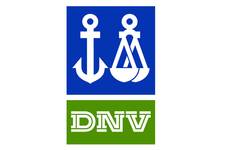
DNV
DNV (Det Norske Veritas) is an international accredited registrar and classification society headquartered in Høvik, Norway. It was originally founded in 1864 in Norway and has grown to become one of the world's leading providers of risk management and quality assurance services.
Core Areas of Operation:
Maritime: DNV is one of the world's leading classification societies, providing services for the safe and reliable operation of ships and offshore structures. Their classification services involve technical assessments, certification, and verification to ensure that marine structures comply with set standards.
Oil & Gas: The company offers a wide range of technical and advisory services to the oil and gas industry. This includes risk management, technical assurance, and project implementation support across the entire value chain, from exploration and production to refining and distribution.
Energy: DNV is heavily involved in the energy sector, including renewables like wind and solar energy, as well as traditional energy sources. They provide certification, advisory, and risk management services to ensure the efficiency and safety of energy systems.
Business Assurance: The company offers certification, assessment, and training services to various industries. This includes quality management systems, environmental management systems, and health and safety standards.
Digital Solutions: DNV is focusing increasingly on digital transformation. They offer software and digital solutions that help clients manage risk, improve safety, and optimize operations. This includes services like data analytics, cyber security, and digital twins – virtual replicas of physical systems used for simulation and analysis.
Healthcare and Life Sciences: DNV offers certification and advisory services in the healthcare sector, ensuring that hospitals and healthcare organizations comply with international standards for quality and safety.
Milestones:
- 1864: Founded to inspect and evaluate the technical condition of Norwegian merchant vessels.
- 2013: Merged with Germanischer Lloyd, another leading classification society, to form DNV GL.
- 2021: Rebranded back to DNV.
Global Presence:
DNV operates in more than 100 countries and employs around 12,000 people globally. The company has a diverse clientele across multiple sectors including maritime, oil and gas, energy, healthcare, food and beverage, and many others.
Commitments to Sustainability:
DNV is committed to the United Nations Sustainable Development Goals (SDGs) and aims to contribute positively to global sustainability efforts. They offer services that help organizations minimize their environmental footprint and improve their sustainability practices.
Innovation and Research:
The company invests significantly in research and development, focusing on innovation and technological advancement. They have a number of joint industry projects and partnerships with academic institutions to stay at the cutting edge of industry standards and technology.
Unique Selling Proposition:
- Extensive industry expertise
- Global reach with a local presence
- Strong focus on digital transformation and sustainability
- Comprehensive range of risk management and quality assurance services
DNV's broad range of services and commitment to sustainability and innovation make it a trusted partner for businesses worldwide, helping them navigate complex challenges and achieve operational excellence.
Maritimer Services
- Phone: 281 721 6657
- Web: www.dnv.com
- Fax: 281 721 6907
Locations
DNV News
DNV Alternative Fuel Vessel Orders for January 2026

According to the latest figures from DNV’s Alternative Fuels Insight (AFI) platform, a total of 20 new orders for alternative-fueled vessels were placed in January 2026. Activity continues to be dominated by LNG-fueled container vessels, which accounted for 16 of these orders, with one methanol-fueled offshore vessel and three LPG vessels making up the remainder.“This is a relatively positive start to the year in the alternative-fueled space.
Nuclear-Powered DP Vessels Technically Feasible, Vard Study Shows

A study led by Vard, a subsidiary of Italy’s Fincantieri, has found that nuclear-powered offshore vessels are technically feasible, confirming that small fourth-generation nuclear reactors can be integrated into dynamically positioned vessels while meeting safety, redundancy and operational requirements.Results from the NuProShip II research and innovation project show that nuclear propulsion can support DP2 power architectures…
Beetronics Displays Achieve DNV Type Approval for Marine Use

Beetronics Inc. has officially received DNV Type Approval for a selection of its metal monitors and touchscreens. The approval validates the product series against the applicable DNV framework, confirming their resilience against vibration, temperature extremes, and humidity found in maritime operations.This certification supports the use of Beetronics displays across a wide range of environments,…
LNG-Fueled Container Ships Prop Up Alternative Fuel Orders in 2025, DNV Finds

LNG-fueled container ships helped sustain the share of alternative fuels in the global shipbuilding orderbook in 2025, even as overall newbuilding activity slowed sharply following a record year, according to data from classification society DNV.Annual figures from DNV’s Alternative Fuels Insight platform show that while total newbuild orders fell to 2,403 vessels in 2025 from 4,405 a year earlier…
Saipem Gets DNV Certification for Offshore Asset Lifecycle Management

Saipem has obtained ISO 55001:2024 certification, the international standard for asset lifecycle management, marking a significant milestone in its journey towards operational excellence and offshore sustainability.The certification, issued by DNV, confirms Saipem’s Asset Management system compliance with the most advanced requirements, covering all operational phases - design, procurement, installation…
Great Ships of 2025: R/V David Packard

In 2010, the Monterey Bay Aquarium Research Institute (MBARI) began the process of replacing its research vessel, R/V Western Flyer. With Glosten at their side as vessel designer, MBARI considered three types of ships for their new project. The Western Flyer was a small waterplane area twin hull (SWATH), but the parties agreed on a monohull design for the new vessel. In 2021, Freire Shipyard won the bid to build the vessel…
DNV Approves CMES-Tech’s Tilting Rotorsail Design
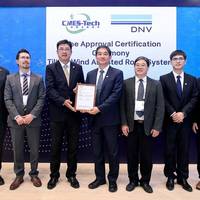
DNV has granted a Type Approval Design Certificate (TADC) to CSSC Shanghai Marine Energy Saving Technology (CMES-Tech) for its new 35-meter tilting type wind assisted rotor system.This is the first domestically developed rotor sail system in China to achieve this recognition under DNV’s WAPS rules (ST-0511). With this certification, the system is confirmed ready for installation on DNV classed commercial…
DNV Greenlights Next-Gen 21,700 TEU Ammonia-Fueled Container Ship
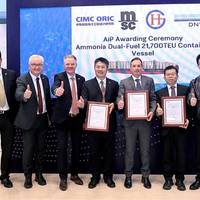
DNV has awarded an Approval in Principle (AiP) to the joint consortium of MSC, Zhoushan Changhong International, and CIMC ORIC for a new 21,700 TEU ammonia-dual fueled ultra-large container ship design.The AiP is another milestone in the development of next-generation, zero-carbon mainline container shipping.The proposed 21,700 TEU container ship integrates the latest-generation of ammonia dual-fuel main engines alongside oversized C-type ammonia tanks.The hull design…
DNV Awards Jiangnan Shipyard AiP for Intelligence System
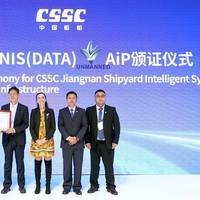
DNV has awarded Jiangnan Shipyard an Approval in Principle (AiP) for its Jiangnan Intelligent System JNIS (DATA) under the D-INF(S) class notation. Jiangnan received the recognition for their standardized onboard data platform which is aligned with ISO 19847 and ISO 19848.The accelerating digital transformation of the maritime industry depends on trusted, high-quality data collected systematically from sensors, control systems, and other onboard sources.
DNV: Methanol Emerging as Scalable Marine Fuel but Economics Still Limit Uptake
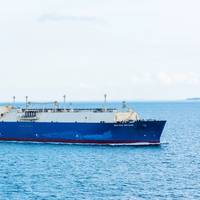
Methanol is emerging as a practical alternative fuel for deep-sea shipping as engines and technical systems reach high readiness levels, but high costs and limited supply continue to constrain wider adoption, classification society DNV said in a new report.As the industry explores multiple decarbonization pathways, methanol is gaining attention as a practical and scalable alternative fuel for deep-sea shipping…
New Global Benchmark Ranks Top Container Ports Worldwide

Maritime transport carries close to 90 percent of global trade by volume, and container ports alone handle more than 80 percent of non-bulk merchandise. Today, these ports are undergoing a profound transformation, driven by rising trade flows, rapid advances in technology, and mounting pressure to meet climate targets.Against this backdrop, DNV and Menon Economics have introduced the industry’s first global container port ranking.
DNV, WMMF Publish Guide to Support Shipowners' Path to Net-Zero
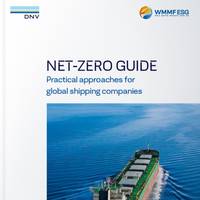
The maritime industry is experiencing a period of significant transformation, driven by evolving regulations, increasing commercial pressure, and a global shift towards reducing greenhouse gas (GHG) emissions. In response, DNV and the World Maritime Merchants Forum (WMMF) ESG team have published a new guide to help shipowners navigate these evolving challenges, an effort supported by industry organizations…
30 New Alternative-Fueled Vessel Orders Placed in October 2025

According to the latest figures from DNV’s Alternative Fuels Insight (AFI) platform, 30 new orders for alternative-fueled vessels were placed in October 2025.Of these, 26 were LNG-fueled vessels, all coming from the container segment.The remaining four orders were for methanol-fueled vessels, with three of these in the tankers segment.A total of 222 orders for alternative-fueled vessels were placed in the first 10 months of 2025, just under half (52%) of orders placed in the same period in 2024.
HD KSOE Gets DNV’s Blessing for Nuclear-Powered Container Ship Design
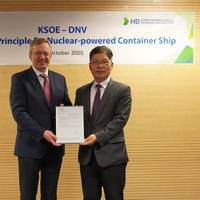
Classification society DNV has awarded HD Korea Shipbuilding & Offshore Engineering (HD KSOE) an Approval in Principle (AiP) for a new 15,000 TEU container vessel design powered by Small Modular Reactor (SMR) technology.The design demonstrates the application of SMR technology in a 15,000 TEU container vessel, capable of operating at 24 knots.The vessel concept incorporates a supercritical CO2-based power generation system…
Nuclear-Powered Ships on Distant Course to Net-Zero Horizon, DNV Finds
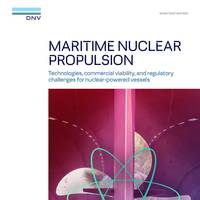
Growing environmental pressures are reviving interest in nuclear propulsion as a potential long-term route to decarbonize shipping, DNV said in a new paper, despite there being no civilian nuclear-powered vessels built for more than four decades.DNV’s latest report, Maritime nuclear propulsion: Technologies, commercial viability, and regulatory challenges for nuclear-powered vessels, highlights how maritime nuclear technologies differ from land-based reactors…
Yinson Production Nets DNV Approval for New FPSO Hull Design

Yinson Production has received Main Scantling Approval (MSA) from classification society DNV for its Meridian purpose-built floating production, storage and offloading (FPSO) hull design.The newly approved Meridian FPSO hull is designed to perform in challenging offshore environments.It merges low carbon innovation with high performance adaptability, engineered to meet the intensifying demands of deepwater…
DNV Certifies OceanWings’ Wind Assisted Propulsion System
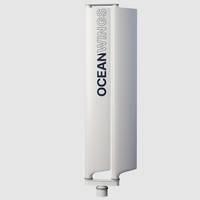
OceanWings has received a Type Approval Design Certificate (TADC) from DNV, marking a major milestone in the industrial validation of the company’s automated wingsail propulsion system.The certificate confirms that the design of the rigid OceanWings system, in both its tiltable and fixed configurations, meets DNV’s rigorous technical and regulatory standards for safety, reliability, and operation.The…
DNV Awards AiP to HD HHI for Vessel Designs with Forward Accommodation, WAPS
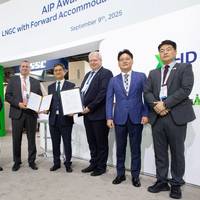
At Gastech 2025, DNV awarded an Approval in Principle (AiP) to HD Hyundai Heavy Industries (HD HHI) for the design of next-generation LNG carriers (LNGC) and Very Large Ethane Carriers (VLEC) with forward accommodation and Wind-Assisted Propulsion Systems (WAPS). The designs, featuring 174K LNGCs and 100K VLECs (Ethane/LPG carriers), are the first from HD HHI to combine a forward accommodation layout with the integration of tiltable rotor sails.
DNV, HD Hyundai Heavy Industries Team Up to Optimize LNG Carrier Design
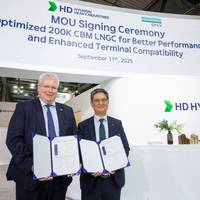
DNV and HD Hyundai Heavy Industries (HD HHI) have signed a memorandum of understanding (MoU) to collaborate on the development and verification of an optimized 200,000 cubic meter liquefied natural gas (LNG) carrier.The new design aims to deliver improved operational efficiency and enhanced terminal compatibility compared to previous vessel designs.Under the agreement, DNV will carry out design verification of HD HHI’s streamlined LNG carrier…
DNV: Green Fleet Readiness Surges Ahead of Fuel Supply
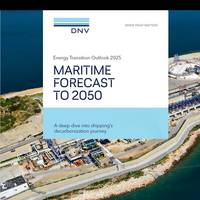
By 2030, the alternative-fueled fleet will be able to burn up to 50 million tons of oil equivalent (Mtoe) of low-greenhouse gas (GHG) fuels annually, double the estimated volume needed to meet the International Maritime Organization’s (IMO) 2030 emissions target. Yet today, actual consumption of low-GHG fuels remains at just 1 Mtoe. This widening gap between capacity and use highlights both the scale…




